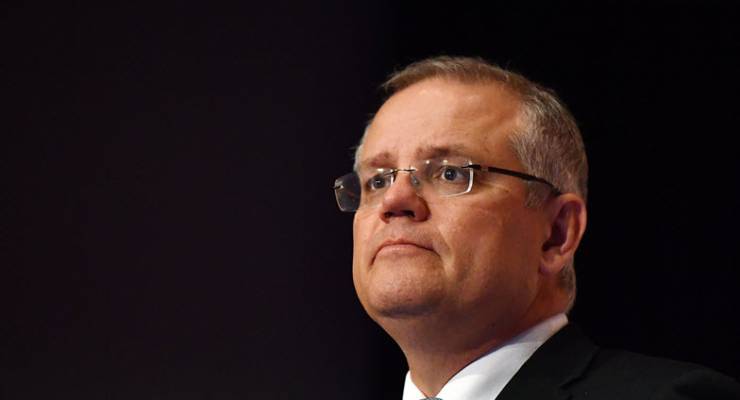
On my trip into Indianapolis from the airport, my driver sussed me out: “you’re either here for religious freedom or the death of manufacturing”. I laughed and said while I’m interested in both, I was there on a non-partisan tour to understand how the religious freedom issue came about and the response.
Indiana is the Bethlehem of religious freedom. In 2015, then-governor Mike Pence advocated for and signed into law legislation that allowed individuals and businesses to use their religious beliefs to deny service to, primarily, LGBTIQ people — but also religious and racial minorities.
Pence signed the law surrounded by fundamentalist Christians without media present, as the backlash had already begun. Since then, the criticism has only increased. Indiana’s religious freedom laws are viewed as near-universally negative, even to those who were initial advocates. Politicians have lost their seats, the small group of religious heads who supported the laws have been marginalised, and Mike Pence, despite becoming Vice President, is reportedly derided by even Donald Trump for his homophobia.
Nevertheless, these laws may not be entirely dissimilar to what Prime Minister Scott Morrison is considering for Australia. Attorney-General Christian Porter has suggested the Commonwealth is drafting legislation based off the currently unreleased Ruddock Religious Freedom Review.
If the laws are in the vein broadly categorised by Morrison, they could well be in line with the Indiana experience — one that is in opposition to what lawyers and experts believe is required.
Agitation and rejection
In 2015, at the height of debate around the legislation, Katie Blair, advocacy director of the American Civil Liberties Union (ACLU), organised sympathetic religious leaders to campaign against the laws. Many grew to realise that these laws tarred them as bigots — a label they were trying to actively reject. Their frustration culminated with a protest inside the State Capitol building with dozens of priests, bishops and nuns chanting in unison in opposition.
The community rallied too. Kit Malone, a trans woman working with ACLU, would go to small rural regions of Indiana to explain the laws. Criss-crossing the state, Malone would often enter community halls and local governments as the only one against the laws. But slowly, over hours, days and weeks, people across the state realised that these laws were dividing them and legislating second-class citizens.
This was not always easy; Malone was run out of town on more than one occasion.
Throughout the state, small businesses sported stickers on their doors saying they serve everyone. A rainbow and a cross on the stickers made it clear they had no interest in denying you service, whether you were coming straight from church or stumbling out of Greg’s, a local gay club, at 3am.
Indiana has a majority Christian population, and in some parts of the state that sticker was a distinct act of defiance.
This happened in big businesses too. Eli Lilly — a global pharmaceuticals company headquartered in Indiana — threatened to halt workforce expansion and new investment. The company organised other large employers to come out, in various ways, in protest. They even deployed lobbyists to reverse the laws. This was 2015, before corporate activism like Nike and Colin Kaepernick were more common.
Their chief lobbyist put it simply: “we don’t come out on social issues, but this went to the heart of who our staff were, what we wanted our workplaces to be and it was quickly tarnishing Indiana”.
Sound familiar?
On my visit last year, I heard people from business, government and non-profits across the state all speaking with a clear voice: the ability to discriminate against people, be that sexuality, faith or otherwise, was not right and not desirable. This was the overwhelming message from many outside the spheres of power and influence too.
The young woman who made my coffee every morning said that the laws felt personal to her. She was straight, but her LGBTIQ friends were scared of their communities. In the heat of the debate she said hurtful things to her parents, who sympathised with the laws. Eventually they saw her point of view. “These laws forced us to have a conversation we didn’t want to have,” she told me on my final morning, “the road was rocky but we got to a better place”.
As my time in Indiana came to a close, it was clear that the laws had little credence. Once people understood the laws and their impact, socially, economically and personally, they were roundly rejected. It’s a pattern not dissimilar from Australia’s vote for marriage equality just last year.
Former attorney-general George Brandis infamously said that we all ave the right to be bigots. He’s right, we do. But free speech ends when it prohibits that of others, and Australia doesn’t need laws which implicitly or otherwise promote discrimination. The Prime Minister shouldn’t need to be reminded of that.
Conrad Liveris is a corporate adviser on workplaces and risk, he has worked in civil society and public policy. He went to Indiana as part of the US Government’s International Visitors Leadership Program in 2017 to consider civic engagement, including religious freedom.








Malcolm had far more chance of selling legislation that allowed zealots to discriminate. This country simply wont let a tongue talking, snake handling PM away with this.
We should be winding back the exemptions religion currently has – from discrimination laws and tax.
Not imposing new religious “freedom” laws.
As I understand it, the Australian Constitution prohibits the country from enacting law to favour one religion over another, or to promote one religion over another.
But does that also cover the choice of no religion?
Is enacting laws to promote the freedom of religions to discriminate unconstitutional because it promotes religion over non-religion?
Also, in my opinion, if someone refuses to provide a service based on their religious beliefs, they are not exercising their religious freedom, but imposing their religion on others.
As I have said before, freedom of religion also includes freedom from religion.
Agree – with the sentiments – but how does one remedy the other side of the coin when students with a sense of humour were persecuted by a government agency and their university and subjected to greenmail by a an enterprising lawyer. OR is that just an inconvenience?
This comment has literally NOTHING to do with the article.
Yes it has – compartmentalising the frictions in society does not solve any of the individual problems – a process should be developed whereby the zealots are controlled without resorting to crucifixion – which was the Roman solution and some people still have the same mindset.
Firstly this has nothing to do with 18C. I’m reminded of the way marriage equality opponents so often tried to make the debate about (already legal) gay and bi people parenting kids as if somehow opposing marriage equality would change other laws automagically.
Secondly, it is almost impossible to prevent any law being misused at the absolute margins in edge cases. The fact that people raging at 18C still need to hang their hats on one incident is telling. Speaking as a lawyer – aggrieved people often pursue those they perceive as having aggrieved them far beyond what you and I might regard as reasonable, but that is their right. If there’s an issue, it is legal procedure which prioritizes allowing people to have their full say and generally errs on the side of allowing people to pursue their claims too long without dismissing them or otherwise bringing the case to a head, but it’s not a problem exclusive to the Human Rights Commission or the Anti-Discrimination Act.
Yes it has – shows too many laws trying to legislate the nuances of human behaviour have the opposite effect. Parliament – or any legislative body should decrease regulation and allow society to smooth out the bumps in urbanisation.
Urbanisation you say….tell me more.
It is blatently obvious that Australia’s current collapse from the laughingly referred to as Liberal Party side of politics has come about by “Parliament-or any legislaive body…” having the freedom to fuck with our Constitution-among other things. So in future I suggest you venture forth clear in your understanding as to where the real fault lies..
Smugmo is too rusted on to his pentecostal beliefs to have the intelligence to realise just how much of a mistake Ruddock’s witch hunt for religious rights is. His girls must not be exposed to alternative points of view because they might end up disagreeing with their father.
It is analogous with the secrecy shrouded TPP of yore that we have not been afforded the joyous edification of the Cadaver’s report being made public.
What are the odds that there might even be a blasphemy law in the offing?
That would be fun.